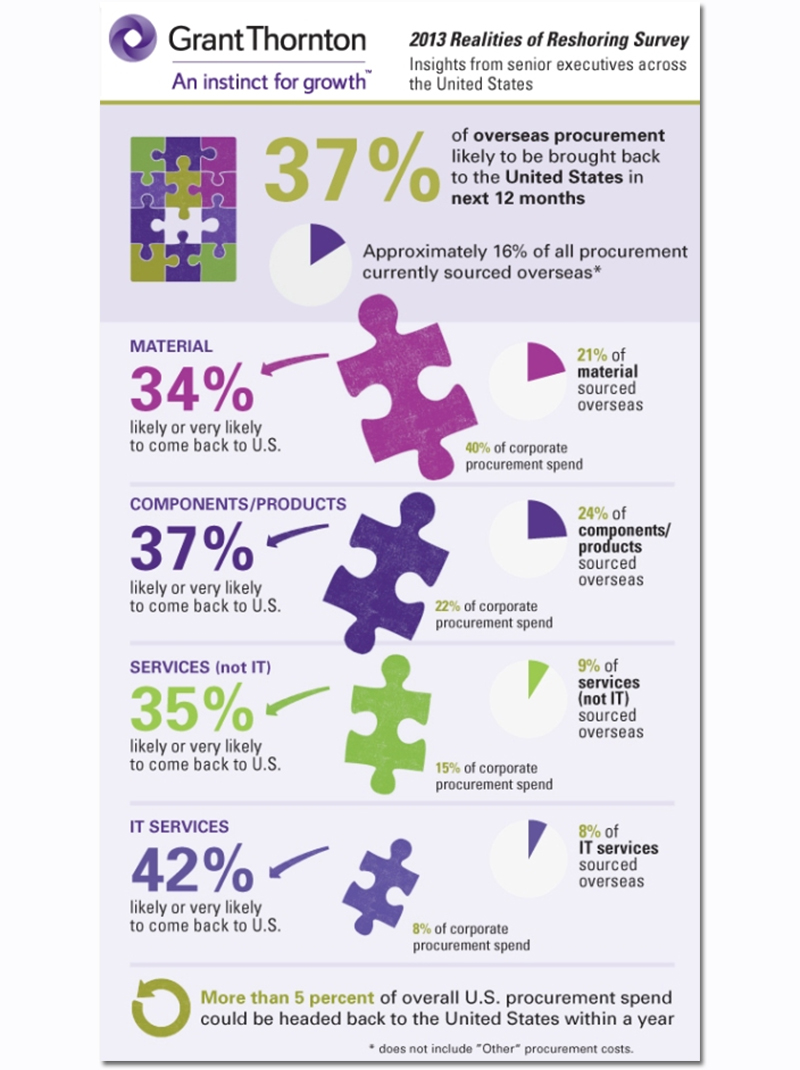More than one-third of U.S. businesses will move goods and services work back to the United States in the next 12 months, according to the results of the Grant Thornton Realities of Reshoring survey.
The numbers imply that as much as 5% of overall U.S. procurement may come back to the United States.
“The idea of going overseas was to drive costs down,” said Wally Gruenes, Grant Thornton’s national managing partner for industry and client experience.
In a recent interview, Greunes went on to suggest many have identified cost savings in the sophisticated analysis of data they receive from business partners in the supply chain. “Now, most manufacturers are looking for partnership to share information at a very detailed level.
The extent to which suppliers are willing or able to share that information could inform whether they’d like to do business. They might need collaboration or face-to-face meetings, and the proximity of a supplier can be important.”
Executives indicated their companies are likely or very likely to bring back the following categories of work: IT services (42%); components/products (37%); customer services or call centers (35%); and material (34%).

The Realities of Reshoring survey shows more than one-third of U.S. businesses will move goods and services work back to the U.S. over the next 12 months.
“These results could dramatically impact U.S. trade balances, and should provide an enormous boost to domestic manufacturers, retailers, wholesaler/distributors and service providers,” Gruenes said. “It’s an ideal time for executives to assess reshoring opportunities by thoroughly evaluating all tangible and intangible costs related to offshore suppliers.”
In addition to the potential for deeper collaboration, the proximity of a supplier can reduce the impact of transit time on service levels. “A complete analysis should consider the timely delivery of supplies and materials, quality issues and the process of addressing any defects,” said Gruenes. “A local supplier can fix these issues more immediately, and that creates a win/win for the supplier and the manufacturer.”
Gruenes suggests it’s about determining the total cost of delivering a product to the customer, not just the cost of the individual product. If effective enough, he said, a strong partnership can even create a competitive advantage worth a premium. In any case, domestically-based manufacturing and information technology functions will now benefit from technology that has improved significantly since the jobs were first outsourced decades ago.
“Those who bring production back tend to utilize robotics and automation to design major process improvements,” Gruenes said. “And it makes sense for information technology given cloud computing, social media activity and other technologies that cost a lot less.”
For both manufacturing and IT services, the job exchange will rarely be one-to-one. “For instance, in the past it might have taken 100 people to staff a call center and it now might take half that, given the available technologies.”
Other highlights from the survey include:
- Only 9% of respondents describe their supplier relationships as “partnership (sharing intellectual property, cost savings)” with significant added value; in fact, a strong majority (64%) describe their supplier relationships as limited-value “buy and sell (i.e., transactional, focused primarily on cost)” exchanges.
- Executives are reshoring because they expect cost efficiencies (28%), improved quality (26%) and more timely deliveries (29%).
About the survey
Grant Thornton’s Realities of Reshoring survey reflects findings from more than 275 chief executive officers, presidents, chief financial officers and partners across a number of different industries, including manufacturing, retail and wholesale/distribution. The survey was conducted in Aug.-Sep. 2013.
Related: All SC24/7 Resources on “Reshoring”
About the Author
Follow Robotics 24/7 on Linkedin
Article topics
Email Sign Up

















